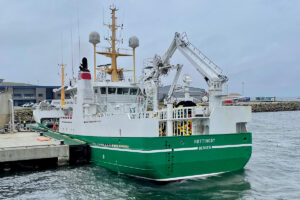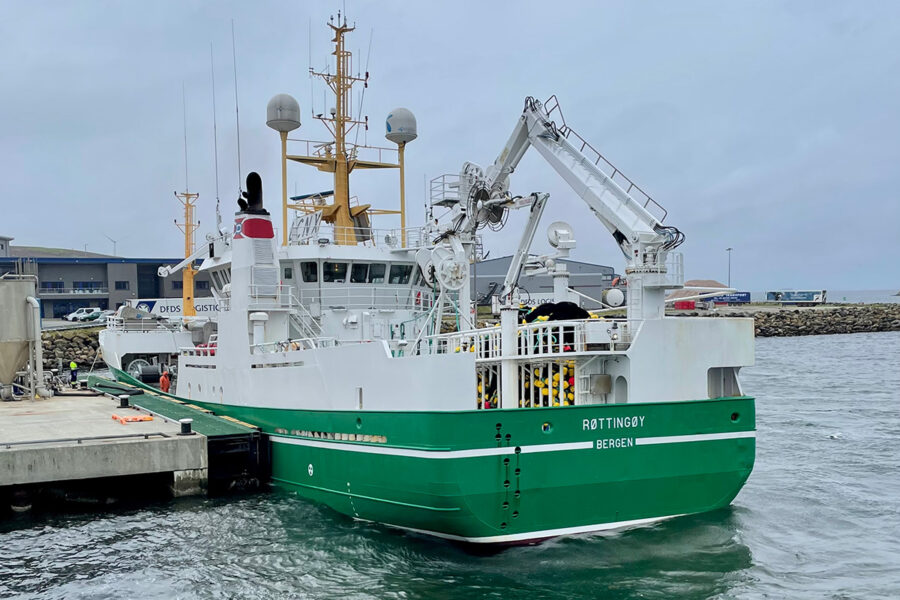Statements from both the UK fisheries minister and the Scottish cabinet secretary for rural affairs claiming a successful outcome to negotiations with Norway on 2023 fishing opportunities were given a less than warm reception by many in the fishing industry last week, reports Andy Read.

The Norwegian purser Røttingøy landing to Pelagia Shetland in June. The UK and Norway have renewed access to catch up to 20,000t of herring in each other’s waters. (Photo: Sydney Sinclair)
Shetland Fishermen’s Association executive officer Simon Collins said that it was too early to say whether quota swaps with Norway will have a positive impact on the local whitefish fleet. He added that the conclusion of the UK-Norway negotiations was ‘just the first piece in a jigsaw that will be put together in the coming weeks’.
The full details of 2023 catching opportunities as a result of these talks were not yet clear, he said, and depended on ongoing negotiations with the EU and Norway, and on bilateral coastal state discussions with Faroe, as well as the ongoing impasse between NEAFC members about shared pelagic stocks.
UK Fisheries, the Humberside- based operator of the freezer trawler Kirkella, reacted with horror to the outcome of the talks, which cement an ongoing decline in distant-water whitefish quotas that has already seen it confirm the tie-up and sale of its vessel Farnella.
Jane Sandell, CEO of the company, said: “This is yet another body blow for fishers in the North East of England. While the government is gloating over its ‘success’ in the Norway talks, we are having to make skilled people redundant in the Humber region. It’s an absolute travesty of fairness and common sense.
“The few extra tonnes of whitefish in the Norwegian zone won’t come close to offsetting the loss in Svalbard due to the reduced TAC. Defra knows this, and yet it simply doesn’t seem to care about the English fleet. Right now, and not for the first time, the only people celebrating will be the Scottish pelagic barons.
“Defra claims to be looking after all sectors of the industry, but it has repeatedly and deliberately discriminated against distant-waters fishing, blaming this on the fact that UK Fisheries has foreign owners – even though we represent one of the few parts of the industry that is making significant investments in and broader contributions to the British economy.”
Defra claimed that in total, the deal reached would see an overall £5m increase in value of fish obtained through the agreement – £3m in the Arctic and £2m in the North Sea – as well as providing access to the Norwegian zone of the North Sea to the UK demersal fleet. This includes 750t of Arctic cod quota, and 1,100t of demersal species in the North Sea.
In spite of the continued impasse on agreeing pelagic quota shares, the deal also gives the UK and Norway reciprocal access to each other’s waters to catch up to 20,000t of herring in 2023.
Claiming the deal as a successful outcome for the UK, fisheries minister Mark Spencer said: “I’m delighted to reach a deal with Norway for 2023 which gives UK fishing vessels access to key fish stocks and quota in the North Sea and Arctic, and look forward to continuing to work collaboratively with Norway and other coastal states to manage fishing sustainably.
“The agreement highlights both parties’ continued commitment to manage fisheries sustainably and support the long-term viability of stocks in the North Sea. It sits alongside a separate arrangement the UK has with Norway under which we expect over 5,200t of additional Arctic opportunities to be transferred to the UK in 2023.
“In total, this should provide the UK fleet with over 6,000t of fishing opportunities in Arctic waters.”

A Brexit bonanza? UK distant-water whitefish quotas in the last decade – these exclude quota in Greenland waters, the last of which was a 1,685t allocation in 2020.
Also welcoming the deal, Scottish cabinet secretary for rural affairs Mairi Gougeon said: “This is a good outcome for Scotland’s fishers, which builds on the successful arrangements for 2022. Norway is one of our closest coastal partners and we share a number of fish stocks in the North Sea. I am pleased that a deal has been reached that will deliver benefits for both nations.
“In particular, we have secured an increased inward transfer of monkfish. With the scientific advice for 2023 requiring a cut in overall monkfish quotas, this will play an important role in ensuring Scottish fishers can maintain access to this key stock.”
The transfer comes against a backdrop of a suggested 30% cut in the overall North Sea monkfish TAC, a key concern to the Scottish whitefish fleet, which has long claimed that evidence available for this stock has not been fully been taken into account by scientists.
Agreement on monkfish, and five other stocks shared trilaterally between Norway, the EU and the UK, are expected to be made later this month.
Speaking ahead of the talks, one EU source said that discussions had been made ‘doubly difficult’ after the UK backed Norway in a vote against the EU at the recent NEAFC meeting. It was suggested that the vote, related to bycatch in the Norway shrimp fishery, was in part cast by the UK to support a favourable outcome in the bilateral discussions.
This story was taken from the latest issue of Fishing News. For more up-to-date and in-depth reports on the UK and Irish commercial fishing sector, subscribe to Fishing News here or buy the latest single issue for just £3.30 here.








